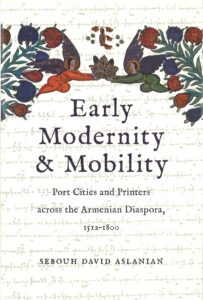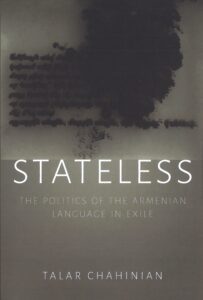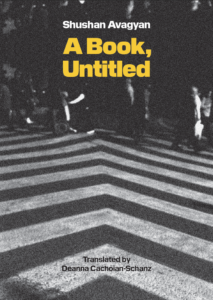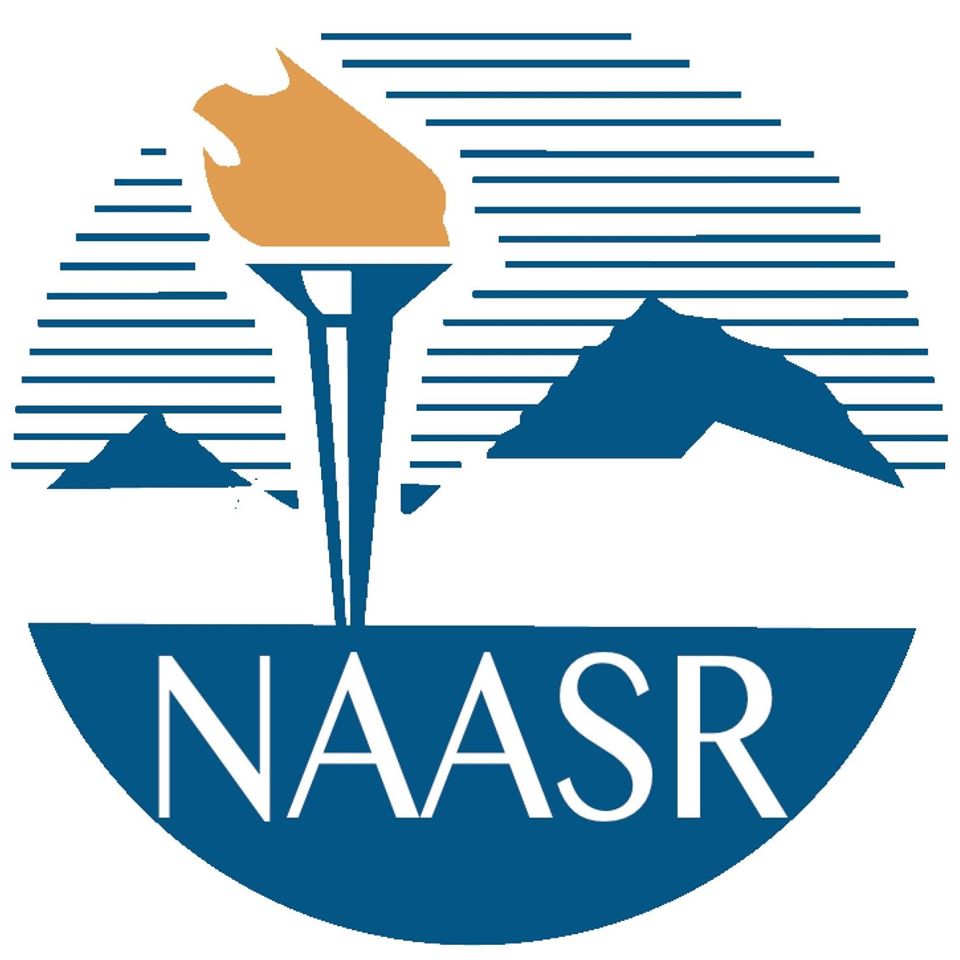The National Association for Armenian Studies and Research (NAASR) is pleased to announce the 2024 Dr. Sona Aronian Book Prizes for Excellence in Armenian Studies, jointly awarded to Dr. Sebouh D. Aslanian for Early Modernity and Mobility: Port Cities and Printers Across the Armenian Diaspora (Yale University Press, 2023) and Dr. Talar Chahinian for Stateless: The Politics of the Armenian Language in Exile (Syracuse University Press, 2023); and to Deanna Cachoian-Schanz for A Book, Untitled (Awst Press, 2023), a translation of Shushan Avagyan’s Գիրք-անվերնագիր (2006). The 2024 awards are for books with a 2023 publication date.
 Sebouh D. Aslanian holds the Richard G. Hovannisian Chair in Modern Armenian History at UCLA. Early Modernity and Mobility explores the disparate yet connected histories of Armenian printing establishments in early modern Europe and Asia. Drawing on extensive archival research, Aslanian explores why certain books were published at certain times, how books were sold across the diaspora, who read them, and how the printed word helped fashion a new collective identity for early modern Armenians. In examining the Armenian print tradition, Aslanian tells a larger story about the making of the diaspora itself.
Sebouh D. Aslanian holds the Richard G. Hovannisian Chair in Modern Armenian History at UCLA. Early Modernity and Mobility explores the disparate yet connected histories of Armenian printing establishments in early modern Europe and Asia. Drawing on extensive archival research, Aslanian explores why certain books were published at certain times, how books were sold across the diaspora, who read them, and how the printed word helped fashion a new collective identity for early modern Armenians. In examining the Armenian print tradition, Aslanian tells a larger story about the making of the diaspora itself.
By email, Aslanian wrote “to express my sincere gratitude to the committee of the Sona Aronian Prize for choosing my book as its co-recipient for the 2023 academic year. It is a great honor and pleasure for me to have my work recognized for such a distinguished prize, in memory of the late Dr. Aronian.”
 Talar Chahinian is a Lecturer in the Armenian Studies Program and Visiting Faculty in Comparative Literature at UC Irvine. Stateless offers a rich exploration of Western Armenian literary history in the wake of the 1915 genocide that led to the dispersion of Armenians across Europe, North America, the Middle East and beyond. Chahinian highlights two specific time periods — post WWI Paris and post WWII Beirut — to trace the ways in which literature developed in each diaspora.
Talar Chahinian is a Lecturer in the Armenian Studies Program and Visiting Faculty in Comparative Literature at UC Irvine. Stateless offers a rich exploration of Western Armenian literary history in the wake of the 1915 genocide that led to the dispersion of Armenians across Europe, North America, the Middle East and beyond. Chahinian highlights two specific time periods — post WWI Paris and post WWII Beirut — to trace the ways in which literature developed in each diaspora.
Chahinian wrote, “I’m thrilled to learn that my book is one of the recipients of the 2024 Dr. Sona Aronian Book Prize for Excellence in Armenian Studies. I’m grateful to NAASR for this recognition and for their continuous commitment to support and promote Armenian Studies scholarship. This award is especially meaningful personally, as its namesake is a reminder of our field’s pioneers and the path that they paved through interdisciplinarity. It’s an honor to share this award with Dr. Aslanian, whose groundbreaking research is a testament to the field’s ongoing reinventions.”
 Deanna Cachoian-Schanz is a translator and interdisciplinary scholar, soon to defend her Ph.D. in Comparative Literature and Literary Theory at the University of Pennsylvania. She first translated A Book, Untitled during her M.A. years at Università Ca’ Foscari in Venice, Italy. Avagyan’s experimental novel stages an imagined encounter between two early twentieth-century feminist writers, Shushanik Kurghinian and Zabel Yesayan, which is juxtaposed by contemporary conversations between the novel’s unknown narrator — an archivist and translator referred to as the “typist/writer” — and her friend Lara. As the two sift through censored documents, unpublished works and unfinished drafts, they piece together the fragments left by their predecessors in the wake of the Tsarist, Stalinist and then Armenian nationalist regimes.
Deanna Cachoian-Schanz is a translator and interdisciplinary scholar, soon to defend her Ph.D. in Comparative Literature and Literary Theory at the University of Pennsylvania. She first translated A Book, Untitled during her M.A. years at Università Ca’ Foscari in Venice, Italy. Avagyan’s experimental novel stages an imagined encounter between two early twentieth-century feminist writers, Shushanik Kurghinian and Zabel Yesayan, which is juxtaposed by contemporary conversations between the novel’s unknown narrator — an archivist and translator referred to as the “typist/writer” — and her friend Lara. As the two sift through censored documents, unpublished works and unfinished drafts, they piece together the fragments left by their predecessors in the wake of the Tsarist, Stalinist and then Armenian nationalist regimes.
Upon being informed of the prize, Cachoian-Schanz wrote that the translation “is the result of overcoming many obstacles. The first was to convince a publisher that contemporary Armenian literature has something unique to share on a global literary stage (and for me, there is no more suitable voice than that of Shushan Avagyan to occupy a place on it). The second (and perhaps the most onerous) was the gatekeeping I encountered at the beginning of my studies in Armenian literary history, when I was told that there were no Armenian women of literary merit to either study or translate.”
Cachoian-Schanz further remarked that the resulting “collaboration between this author and translator, who worked both meticulously and ուսումնասիրով — with loving, studious care — for the book but also, for one another during this translation” stands both as a model for kinship and mentorship as well as a challenge to “erasing or rendering insignificant the voices of women, queer people and other minoritized subjects in the contemporary Armenian reality.” “To this end,” she continued, “I am heartened and grateful that NAASR has found Book a worthy endeavor to be awarded this year’s Dr. Sona Aronian Book Prize for Excellence in Armenian Studies for a Work in Translation.”
NAASR’s Aronian Book Prizes were established in 2014 by the late Dr. Aronian and Dr. Geoffrey Gibbs, to be awarded annually to outstanding scholarly works in the English language in the field of Armenian Studies and translations from Armenian into English.
Authors or publishers wishing to submit books for consideration for future Aronian Prizes may contact NAASR Director of Academic Affairs Marc A. Mamigonian.



Be the first to comment